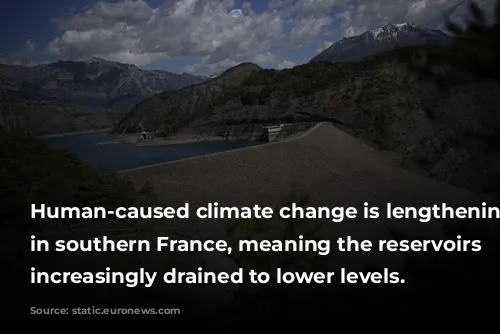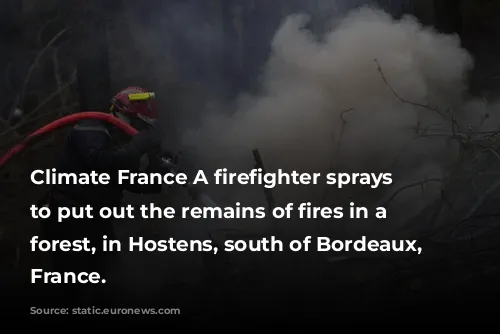Climate change is no longer a distant threat in France – it’s a reality impacting every region. A new report by a coalition of environmental organizations paints a stark picture of the climate crisis in France, detailing specific risks and their escalating severity.
What does this report reveal?
The report delves into the specific climate challenges facing each of France’s 18 administrative regions, including mainland France and overseas territories. The report emphasizes the diverse and localized nature of climate change impacts, stating that “the impacts of climate change are as diverse as France’s landscapes and are not expressed in the same way in all regions.”

From Droughts to Floods: A Country in Transition
Aridity and Water Scarcity
Drought is a growing concern nationwide, posing challenges for households, agriculture, and industry. The report highlights the Loire River, which could see its flow decrease by half in the coming years. Regions like Nouvelle-Aquitaine, with its varied landscapes, are particularly vulnerable. This region, home to nearly 4 million people, faces multiple climate hazards, with drought being the most widespread threat.
The impact of drought extends beyond water scarcity, leading to other challenges. Dry conditions fuel wildfires in forested areas, degrade soil, increasing the risk of flooding in other regions, and put additional strain on already stressed agricultural resources.
Urban Heat Islands: Cities Under Pressure
Cities like Paris are particularly vulnerable to extreme heat, which is expected to worsen in the coming decades. While France has already experienced an average warming of 1.9°C, the report predicts that this could exceed 4°C by 2100 if current climate policies remain unchanged.
Paris, a major urban center, faces a dire future, with projections showing 30 days of heatwave per year and temperatures potentially reaching 50°C by 2050. The urban heat island effect, amplified by concrete and metal structures absorbing heat, exacerbates the issue. This urban heat poses significant health risks, with Paris identified as one of the European cities most susceptible to heat-related mortality.
Floods: A Rising Threat in the North
The Hauts-de-France region faces a different climate challenge – extreme flooding. With six out of ten municipalities at risk, the region has witnessed the devastating effects of torrential rainfall, which in 2023 led to widespread flooding. Urbanization has altered the soil, making it more susceptible to rapid increases in rainfall.
This trend is not unique to Hauts-de-France. The report highlights that across France, there is a shift towards more concentrated rainfall over shorter periods, with less rain in summer leading to drought and more intense rainfall in winter increasing flood risks.
Coastal Erosion: A Looming Threat in Brittany
Brittany, with its extensive coastline, is facing the threat of rising sea levels. The report reveals a concerning trend of accelerating sea level rise in Brest, exceeding 20cm since 1900. This rise poses a significant threat to coastal communities, with over 130,000 people in Brittany already facing the risk of submersion.
Rising sea levels are not the only concern. Coastal erosion is an additional threat, compounded by the impact of rising sea levels.
A Roadmap for Action: Adapting to a Changing Climate
The report’s authors aim to provide a roadmap for local authorities to adapt and accelerate the green transition. This includes understanding the specific challenges in each region and mobilizing resources to address them. The report highlights the critical need for investment, noting that the Institute for Climate Economics estimates that local authorities must more than double their annual investment in the ecological transition to reach current climate goals.
While the report highlights the need for greater investment, it also emphasizes the importance of collaboration and action. The authors hope that the report will serve as a catalyst for collaboration between local authorities, national government, and environmental organizations to address the challenges posed by climate change. By acting collectively, France can navigate the transition to a more sustainable future.
In conclusion, this comprehensive report paints a sobering picture of the impact of climate change on France. The report provides valuable insights into the diverse and localized nature of these impacts, highlighting the need for targeted interventions and increased investment in the ecological transition. It serves as a call to action, urging policymakers, communities, and individuals to prioritize climate adaptation and mitigation efforts. By acting now, France can build a more resilient future and protect its people and environment from the escalating impacts of climate change.


